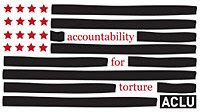The government furthermore asked for a stay in the proceedings of any cases under this ruling:
In sum, the extensive harms to the Government and the public interest involved in further proceedings envisioned by the Court in these cases, and the likelihood of respondents’ success on the merits of appeal, strongly warrant a stay pending appeal.The NYT editorial, "The Next Guantánamo," put it this way:
In February, the new administration disappointingly followed the example of the Bush White House in opposing judicial review for prisoners who have been indefinitely detained at Bagram without any charges or access to lawyers. The administration has now added to that disappointment by appealing a new federal court ruling extending the right of habeas corpus to some Bagram detainees....The growing opposition to Obama's policies on habeas, executive "state secrets" privilege, and other positions aimed at strengthening the Bush-era stand on Executive power, was described by Glenn Greenwald in an article today:
Although Judge Bates’s ruling addresses only 30 of 600 or so prisoners, he found that the process for determining whether a person has been properly labeled an “enemy combatant” even “less sophisticated and more error-prone” than the process the Supreme Court deemed inadequate at Guantánamo. This points to a wider due process problem affecting everyone now held at Bagram.
In the absence of a fair review process that complies with international and military law, there is no reason to feel confident that everyone detained at Bagram deserves to be there. The administration should focus on putting such a process in place, instead of wasting its energies in an appeal that simply recycles extravagant claims of executive power and perpetuates the detention policies of the Bush administration.
Even for the hardest-core Obama loyalists, it's rather difficult to attribute these increasingly harsh condemnations of Obama's civil liberties, secrecy and executive power abuses to bad motives or ignorance when they're coming from the likes of Russ Feingold, TalkingPointsMemo, the Center for American Progress, Nancy Pelosi, EFF, the ACLU, The New York Times Editorial Board, Keith Olbermann, Jonathan Turley, The American Prospect, Bruce Fein, Digby, along with some of the most enthusiastic Obama supporters and a bevvy of liberal law professors and international law experts -- those who were most venerated by progressives during the Bush era on questions of the Constitution and executive power....From one standpoint it doesn't matter what the origins of Obama's motives, his arguments are simply wrong. But from another standpoint, it does matter a great deal, as it educates the citizen about the true underlying power relationships in this country.There is, as Pelosi said this week, clearly a strong aversion -- one might say "desperation" -- on the part of the Obama White House to avoid anything that could increase the pressure to commence investigations and prosecutions of Bush crimes. As Slate's Dahlia Lithwick succinctly put it: "by keeping the worst of the Bush administration's secrets hidden, the Obama Justice Department can defer awkward questions about prosecuting the wrongdoers"....
And Howard Fineman was likely correct when he told Olbermann on Tuesday night that Obama is petrified of alienating the permanent intelligence and military establishments in Washington which might be alarmed by any attempt to abandon these vast powers, particularly where reversing course could raise the likelihood of prosecutions.
Imagine, the President of the United States is beholden to, if not in thrall, to the Pentagon and intelligence agencies, so much so that he would argue anti-democratic and anti-Constitutional arguments redolent of the Bush-era Executive power grab. That's a dangerous situation, but it is most likely the situation the country is in.
The irony is that while we have a Chief Executive arguing for an expanded view of Executive powers, the Chief Executive himself is subordinate to, for instance, the Joint Chiefs of Staff, or the CIA bureaucracy. It all sounds so much like Fletcher Prouty's view of "the secret team," that we may wish to revisit the writings of this much-maligned figure.
The Secret Team (ST) being described herein consists of security-cleared individuals in and out of government who receive secret intelligence data gathered by the CIA and the National Security Agency (NSA) and who react to those data, when it seems appropriate to them, with paramilitary plans and activities, e.g. training and "advising" -- a not exactly impenetrable euphemism for such things as leading into battle and actual combat -- Laotian tribal troops, Tibetan rebel horsemen, or Jordanian elite Palace Guards.
Membership on the Team, granted on a "need-to-know" basis, varies with the nature and location of the problems that come to its attention, and its origins derive from that sometimes elite band of men who served with the World War II Office of Strategic Services (OSS) under the father of them all, General "Wild Bill" William J. Donovan, and in the old CIA.
The power of the Team derives from its vast intragovernmental undercover infrastructure and its direct relationship with great private industries, mutual funds and investment houses, universities, and the news media, including foreign and domestic publishing houses. The Secret Team has very close affiliations with elements of power in more than three-score foreign countries and is able when it chooses to topple governments, to create governments, and to influence governments almost anywhere in the world.









No comments:
Post a Comment